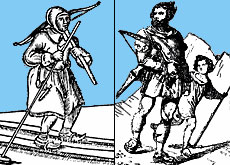Shakespeare’s loss was Schiller’s gain

What if Shakespeare had chosen to write about a Danish archer who shoots an apple off his son’s head instead of a tragedy about a Danish prince?
Then the legend of Hamlet would be largely unknown today, and Denmark’s Toko and not Switzerland’s Tell would be famous the world over.
Scholars are almost certain that Shakespeare’s “Hamlet” is based on a story which first appeared in a 12th century Danish history, “Gesta Danorum”, by Saxo Grammaticus.
If Shakespeare had read the book or, as was probably the case, a 16th century French adaptation, then he may also have read about a Danish marksman by the name of Toko who is ordered by the king to shoot an apple off his son’s head.
But the bard chose “Amleth”, leaving Toko to fade into obscurity, eventually becoming little more than a footnote in the countless essays written about William Tell.
Whatever the case, Tell was not the first father to have been forced by an evil tyrant to take deadly aim at his own offspring.
Norwegian hunters
Preceding Tell were two 11th century Norwegian hunters, Eindridi and Hemingr.
In an attempt to convert Eindridi to Christianity, King Olaf the Saint orders him to shoot at a writing tablet placed on his son’s head.
The episode ends abruptly when the boy’s mother steps in and the king comes to his senses.
Around the same time, another hunter, this one named Hemingr, agrees to a series of sporting challenges with a certain King Harald.
Hazelnut not apple
Foolishly, Hemingr wins each time enraging the king, leaving him no choice but to force the marksman to shoot a hazelnut off his son’s head, or die.
Hemingr succeeds and eventually, like Tell, gets his revenge by killing the tyrant.
A century later the setting shifts to Denmark where Saxo Grammaticus takes up the story.
The medieval Danish scholar named his particular hero Toko – a warrior in the service of the 10th century ruler, Harald Bluetooth.
What is known for certain is that Bluetooth, who introduced Christianity to the Danes, died in battle against his son’s forces.
Exactly how, though, is as much the subject of speculation today as it was in the 12th century, when Saxo Grammaticus used artistic licence to invent the events leading up to the king’s death.
Drunken hero
Toko was not only a brave hunter but a drunkard and braggart to boot.
Boasting of his skill as a marksman during an inebriated moment, he is forced by Bluetooth to do no less than Eindridi and Hemingr did before him.
But with an apple this time.
Like Tell, he reserves an arrow for the king in case he misses with the first shot and harms his son. But Toko succeeds.
He is kept hostage by the king – just as the Swiss hero will be – but instead of escaping by jumping from a boat into a storm-tossed lake, Toko is forced to ski down a steep cliff into the sea.
Toko miraculously survives and proves to be an excellent role model for Tell by murdering the king in an ambush.
William of Cloudesley
A full 200 years would pass before another marksman-cum-hero with a knack for ruffling the feathers of an evil ruler and an eye for apples arrives on the scene.
But medieval Britain would be the stage, not Switzerland. The feats of a forester outlaw are immortalised in the old English ballad, “Adam Bell, Clim of the Clough, and William of Cloudesley”.
There is a lot of carnage leading up to the final scene where events have a familiar ring to them:
“An apple upon his [son’s] head he set,
And then his bowe he bent;
Syxe score paces they were outmet,
And therefore Cloudeslé went…
“Thus Cloudeslé clefte the apple in two,
That many a man it se;
‘Over Goddes forbode,’ sayd the kynge,
‘That thou sholdest shote at me!’”
It would be another 40 years before William Tell arrived on the scene.
swissinfo, Dale Bechtel
Preceding William Tell were:
The Norwegian hunters, Eindridi and Hemingr, as well as the Danish hero Toko, whose story bears the most striking resemblance to that of Tell.
An old English ballad predating the first mention of the Swiss hero also recounts a similar story.

In compliance with the JTI standards
More: SWI swissinfo.ch certified by the Journalism Trust Initiative









You can find an overview of ongoing debates with our journalists here . Please join us!
If you want to start a conversation about a topic raised in this article or want to report factual errors, email us at english@swissinfo.ch.